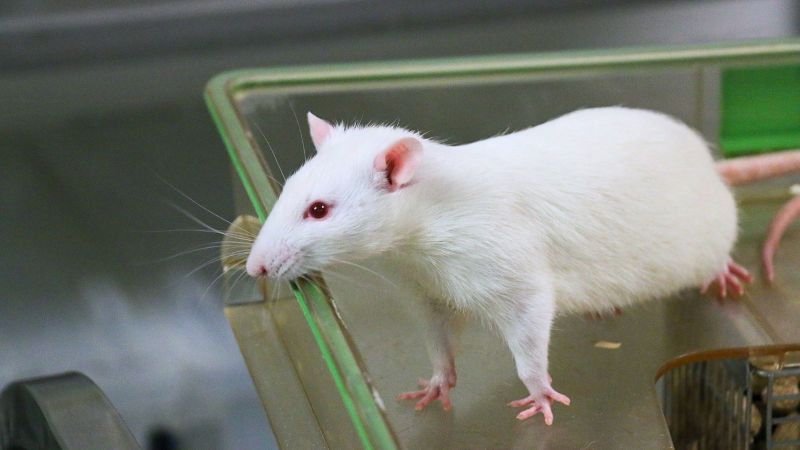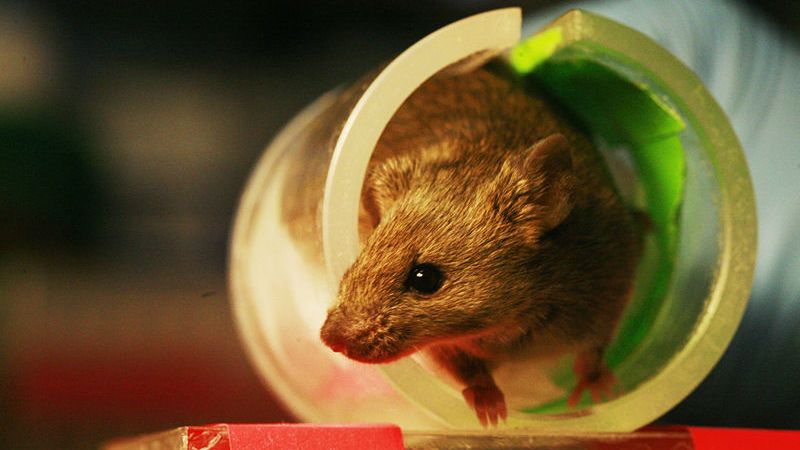09/02/15
Naked mole rats produce hybrid proteins that prevent tumour growth – new key to defeating cancer. Naked mole rats have never been seen to develop cancer despite living up to 32yrs. Scientists have identified a new protein formed by the fusion of two other proteins, which protects the rodent from cancer. The protein appears to increase when cells become crowded together, making mole rats more likely to arrest the growth of cells if they are at risk of becoming malignant. Although humans lack the hybrid protein, it is produced from a cluster of genes also found in humans that makes proteins responsible for preventing damaged cells that might cause cancer from multiplying. Tests show that the protein can prevent human cells from turning cancerous.
Professor Vera Gorbunova, a biologist who helped to lead the study at the University of Rochester, in New York, said: 'While our work doesn't eliminate the possibility that the protein exists under some conditions in mice and humans, the results suggest that it's highly unlikely. The better we understand that gene and control its mutations, the better our chances of controlling some cancers.'
http://www.alnmag.com/news/2015/02/extra-protein-gives-naked-mole-rats-more-power-stop-cancer
10/02/15
Frozen semen from lions can produce embryos. Scientists have successfully produced embryos from African lions via assisted reproduction. What is new here is that they used immature eggs that were retrieved from African lionesses, which were then brought to maturity and injected with lions’ sperm. Assisted reproductive technologies are becoming increasingly important for the breeding of endangered species. Shipping embryos or just sperm cells will reduce possible risk of disease transmission between zoos
“The in-vitro produced embryos of the African lions proved, that the methods developed for domestic cats can also be applied to lions, even though the variations developmental speed of the embryos indicate some fascinating differences between these species”, says Lorena Fernandez-Gonzalez, co-author of the study.
“The successful application of this method of oocytes maturation is of particular importance for species conservation. The retrieval of fertile eggs from animals in the wild is only possible to a limited extend. However, without eggs the assisted reproduction is impossible”, comments Katarina Jewgenow, head of reproduction biology department of IZW.
http://www.alphagalileo.org/ViewItem.aspx?ItemId=149567&CultureCode=en
‘Smart’ insulin tested in mice is a new hope for diabetes. Instead of repeating blood tests and injections throughout the day to keep blood sugar in check, a single dose of smart insulin would keep circulating in the body and turn on when needed. The molecule is a chemically modified version of regular, long acting-insulin. It has extra sets of molecules that allow it to bind to proteins that circulate in the bloodstream when it is off. When blood sugar rises, the smart insulin switches on and glucose locks onto it and tells it to get to work. Animal studies have shown that the technology works but experts caution that it will take years of testing before smart insulin could be used by patients.
Karen Addington, chief executive of JDRF in the UK, said: "For many people living with type 1 diabetes, achieving good blood glucose control is a daily battle. A smart insulin would eliminate hypos - which are what many with type 1 diabetes hate most. It would enable people with type 1 diabetes to achieve near perfect glucose control, all from a single injection per day or even per week. That's really exciting."
http://www.bbc.co.uk/news/health-31291722
Scientists develop potential new therapy based on cow’s molecules for hormone deficiencies. Researchers found that human hormones and antibodies can be fused together, mimicking long cow antibodies. Many people need injections of human growth hormone (hGH) to combat hormone deficiencies, but unfortunately it is degrades very fast by the body. Antibodies however, can last for weeks in the body. The fusion hGH to a coiled version of the bovine antibody is stable and maintains the function of hGH. The antibody-hGH molecule was successful in rat and mice models.
"It acts just like the normal growth hormone," said TSRI Research Associate Tao Liu, co-first author of the new study. "This means the treatment might only need to be injected once a week or even once a month in humans. It would be so much easier for patients."
11/02/15
Avian malaria also affects wild birds in Austria. Avian malaria is not uncommon in Central Europe but in most cases the plasmodium blood parasite transmitted by mosquitoes does not cause any symptoms in the affected endemic wild birds as they have adapted to the parasites. Until recently, only birds kept at Austrian zoos and originating from countries without mosquitoes had been known to be affected by avian malaria. However, Researchers recently showed for the first time, that native birds too are susceptible to avian malaria. Endemic populations of wild birds, however, are not at risk believes lead author Herbert Weissenböck. “Probably, only a small part of the population consistently dies of avian malaria. This has no dramatic effect on the overall population. But it is a completely new fact that native birds are susceptible at all.An infection is life-threatening for penguins at a zoo, for example. Native birds have adapted to the blood parasites over evolutionary time. Most of them carry the pathogen, but do not contract the disease. At least that’s what we thought.”
http://www.alphagalileo.org/ViewItem.aspx?ItemId=149620&CultureCode=en
Gerbils are more tolerant of Plague than rats – understanding why could help us find a way to fight the disease. Researchers are trying to identify the relationship between climate change, rat infestations and the major plague epidemics throughout history to help predict the next plague outbreak. There are still around 2,000 cases of plague annually worldwide. The question is: in which circumstances does plague become pandemic and what determines the level of severity of the epidemic? The study of rodents might help answer that question. Rats spread the contagion during the last outbreak of the diseases and even though there is still no proof that gerbils were carriers, gerbils appear to handle the contagion surprisingly well. Scientists are trying to identify the genetic explanation as to why immune systems of gerbils are so strong against the plague bacterium. To do so they are fully sequencing the gerbil genome. The researchers believe that protection against plague is related to a congenital immune system and that this is hereditary.
"Sometimes a single bacterium kills a mouse. Common rats can tolerate injection of 10,000 bacteria. Gerbils can tolerate 100 billion bacteria. That is ten million times as many bacteria," says PhD research fellow Pernille Nilsson at CEES. "We may also make some surprising discoveries about the immune system of gerbils."
http://www.alnmag.com/news/2015/02/gerbils-more-tolerant-plague-rats
Last edited: 6 April 2022 09:03



